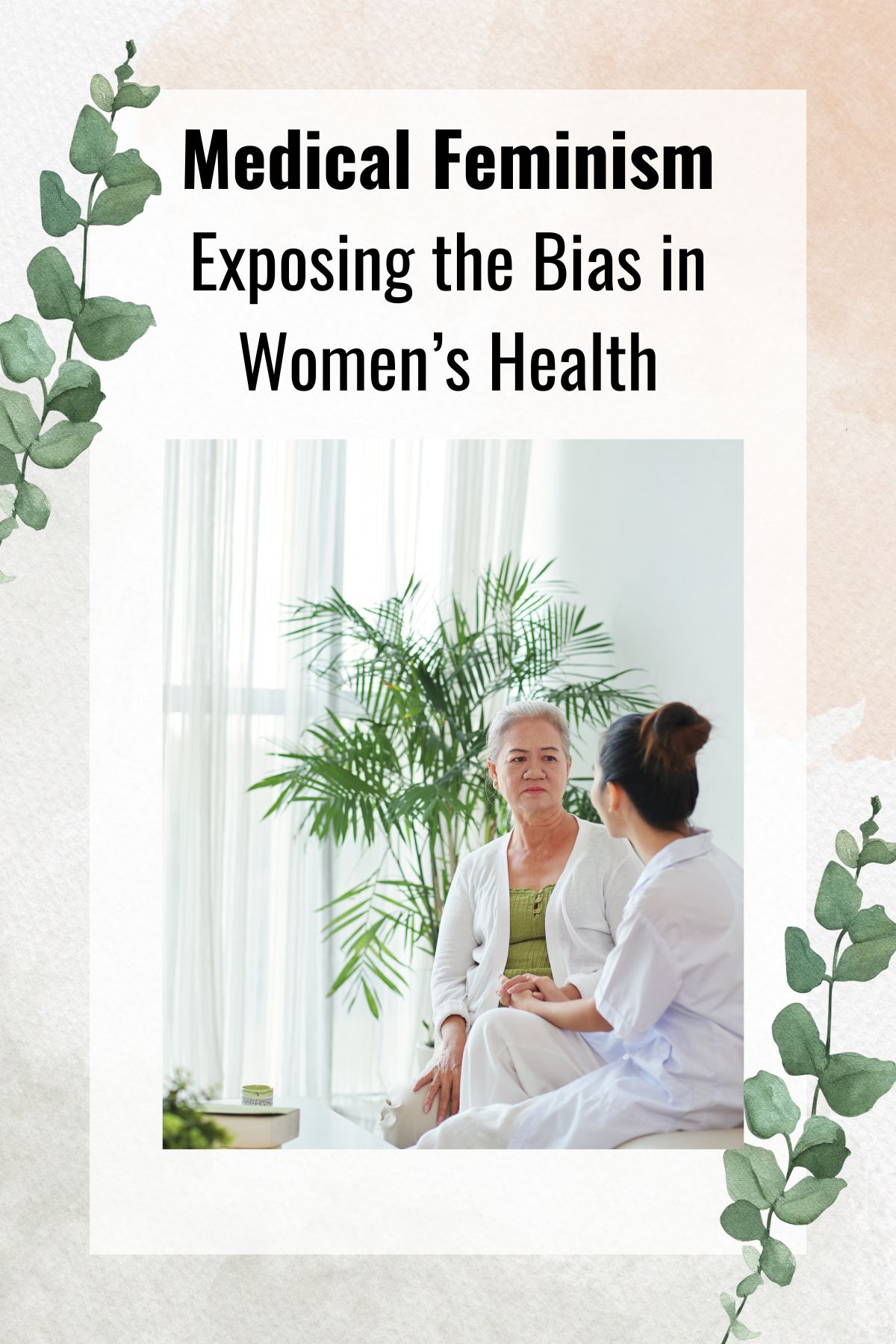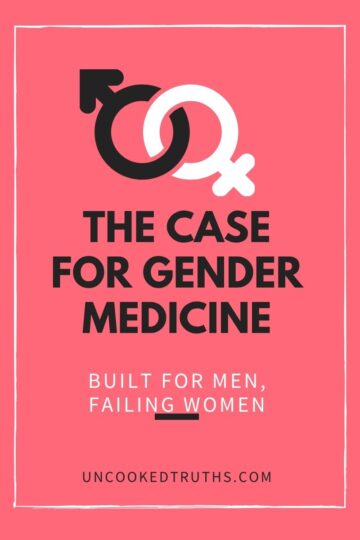Medicine likes to present itself as neutral and objective, but history tells a different story. For decades, research, guidelines, and clinical practice were built around men’s bodies and men’s symptoms. Women were often treated as an afterthought, if they were considered at all.
Medical feminism is the pushback. It is a framework that asks hard questions: Who gets listened to? Whose symptoms are taken seriously? Whose health outcomes are prioritized?
The honest answer is that women, especially in midlife, are still not being served equally.

Jump to:
Disclaimer: This article is for informational purposes only and is not medical advice. Always consult a qualified health care provider for diagnosis or treatment of medical conditions.
What is Medical Feminism?
Medical feminism begins by acknowledging that modern medicine was built by and for white, heterosexual, cisgender men. The system has long reflected their biases, priorities, and assumptions- often at the expense of women and marginalized groups.
Even today, when women and other underrepresented voices are present, structural power imbalances and subtle forms of discrimination still shape medical research, practice, and care.
Medical feminism is a framework for understanding and addressing the gender-based inequities built into modern healthcare. It examines how medicine has historically centered men’s bodies and experiences, leaving women’s health under-researched, underfunded, and often misunderstood.
At its core, medical feminism advocates for equitable, evidence-based, and respectful care that takes women’s biology, life stages, and lived experiences seriously, from adolescence through postmenopause. It challenges cultural, institutional, and scientific biases that dismiss women’s symptoms, limit access to effective treatments, and perpetuate health disparities.
The women’s health movement emerged over 40 years ago in response to the glaring gender bias embedded in a male-dominated medical system. Scholars from the U.S., the Netherlands, and Norway called out healthcare structures that routinely dismissed women’s concerns, ignored their social realities, and devalued their lived experience and knowledge. Sounds familiar?
Core Principles of Medical Feminism
1. Medicine’s Male-Dominated History
For decades, medical research, drug trials, and clinical guidelines were built around the male body as the “default.” Women were often excluded from studies because their hormonal cycles were considered “too complex” for research, especially in cardiology, neurology, and pharmacology.
2. Dismissal of Women’s Symptoms
The movement calls out medical gaslighting, where women’s pain or concerns are minimized, dismissed as “stress” or “anxiety,” or labeled “normal.”
Women’s health has too often been dismissed. Pain is labeled as hysteria, symptoms as weakness, and suffering as something “natural” to endure. Instead of real treatments, we’re given sedatives, or was sent to a psychiatrist to treat the lack of hormones in menopause with anxiety/ depression medicine.
Example: Women having heart attacks are more likely to be misdiagnosed than men because their symptoms often differ from the male-based standard.
3. Reproductive Control vs. Autonomy
Women’s reproductive systems have often been politicized and controlled over centuries, rather than supported. Examples include forced sterilizations, restricted abortion access, and the medicalization of childbirth, where normal labor is treated as a pathology and tightly controlled by male-dominated hospital systems.
4. Menopause, Aging, and Hormone Health
I mention this because it deeply affects me, as a postmenopausal woman. Menopause has often been ignored, pathologized, or shrouded in stigma. Many women are told to “just deal with it” or are denied menopause hormone therapy (MHT) based on outdated interpretations of the 2002 WHI study. Medical feminism demands evidence-based, individualized care that treats midlife women with the same seriousness as any other patient group.
5. Intersectionality
Race, class, sexuality, disability, and age intersect with gender to shape healthcare outcomes. For example, black women in the United States are significantly more likely to die from childbirth complications, not because of biology, but due to systemic racism and inequities in healthcare delivery.
6. Challenging the Beauty and Health Industrial Complex
Medical feminism critiques how aging, weight, and appearance are pathologized. This includes questioning the anti-aging industry, calling out weight stigma in healthcare, and rejecting the false assumption that thin automatically means healthy.
And I want to talk more about some of these issues.
Menopause: Still the Medical Blind Spot
Menopause is a biological certainty for half the population, yet many clinicians receive minimal training, not only in the United States, but around the globe. Surveys in the UK and other countries show that menopause is barely covered in medical school.
After the Women’s Health Initiative published initial results in 2002, use of menopausal hormone therapy dropped sharply across the United States and around the world. This decline often happened without nuance about age, timing, type of hormone, or individual risk.
However, menopause is linked to increased risks for osteoporosis, cardiovascular disease, and cognitive decline, not just hot flashes. It deserves informed, individualized care, not a default of “tough it out.”
Do you know that on average, a woman sees 6-7 different providers before she is finally diagnosed with menopause? We sometimes have to go through expensive and extensive investigations, from cardiology to psychiatry, just to find out that we need estrogen replacement. Every doctor, no matter their specialty, should learn in medical school about menopause so they can easily recognize symptoms and treat accordingly.
Obesity, Weight Stigma, and Weight Loss Medications
Weight stigma is another area where gender bias runs deep. For decades, women were told that weight gain was a personal failure and the “solution” was simply to eat less and exercise more. This ignores the role of hormonal changes, genetics, and metabolic shifts, especially in midlife.
Weight loss medications like Mounjaro, Wegovy, and Ozempic are changing how obesity and metabolic conditions are treated. They have been shown to improve insulin sensitivity, reduce inflammation, and help manage appetite. Yet women using them often face public shaming and assumptions that they are “taking the easy way out.”
Medical feminism asks why a man with diabetes is applauded for using the right medication, while a woman using the same class of drugs is told to “just try harder.”
Other Women’s Health Issues That Get Overlooked
- Endometriosis affects around one in ten women and takes nearly nine years on average to diagnose in the UK.
- PCOS is often managed with symptom control alone, while underlying metabolic issues go untreated.
- Autoimmune diseases affect women disproportionately, with about 80 percent of patients being female.
- Heart disease remains the leading cause of death for women, yet female-specific symptoms are less studied and less recognized.
What Needs to Change
- Equal representation in research, including studies that track hormonal impacts over time.
- Mandatory menopause and women’s health training for all physicians.
- Increased funding for female-focused conditions such as endometriosis, PCOS, and perimenopause/menopause.
- Bias training in healthcare to reduce diagnostic dismissal.
- Access to modern obesity care without stigma, including weight loss medications when medically appropriate.
Medical feminism is not about special treatment for women; it is about fair treatment. When women’s health concerns are dismissed or minimized, the cost is personal, societal, and generational.
My opinion is that it is time for medicine to stop treating women’s health as a niche issue and start building a system that works for everyone.
More Reading To Do
- Menopause in the Workplace: Impact and Solutions
- Confessions from the Other Side of 50
- Food Noise or Hunger? How to Tell the Difference
- How Menopause Affects Marriages and What Saved Mine
- Why Is Menopause Hormone Therapy Treated Like a Dirty Word?
- Menopause Support for Husbands: What You Need to Know






Leave a Reply